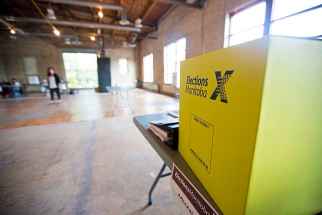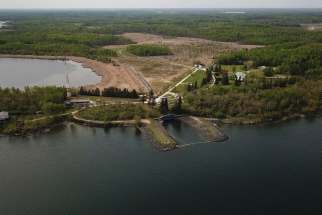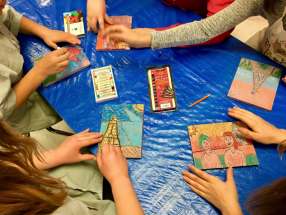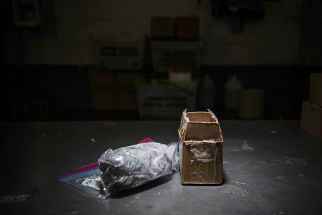‘You can’t put a price tag on any of this’ Guidance, support also needed in wake of Canadian Human Rights Tribunal ruling, local leaders say
Read this article for free:
or
Already have an account? Log in here »
To continue reading, please subscribe:
Monthly Digital Subscription
$0 for the first 4 weeks*
- Enjoy unlimited reading on winnipegfreepress.com
- Read the E-Edition, our digital replica newspaper
- Access News Break, our award-winning app
- Play interactive puzzles
*No charge for 4 weeks then price increases to the regular rate of $19.00 plus GST every four weeks. Offer available to new and qualified returning subscribers only. Cancel any time.
Monthly Digital Subscription
$4.75/week*
- Enjoy unlimited reading on winnipegfreepress.com
- Read the E-Edition, our digital replica newspaper
- Access News Break, our award-winning app
- Play interactive puzzles
*Billed as $19 plus GST every four weeks. Cancel any time.
To continue reading, please subscribe:
Add Free Press access to your Brandon Sun subscription for only an additional
$1 for the first 4 weeks*
*Your next subscription payment will increase by $1.00 and you will be charged $16.99 plus GST for four weeks. After four weeks, your payment will increase to $23.99 plus GST every four weeks.
Read unlimited articles for free today:
or
Already have an account? Log in here »
Hey there, time traveller!
This article was published 06/09/2019 (2289 days ago), so information in it may no longer be current.
No amount of money could ever compensate for the trauma thousands of children experienced after being needlessly separated from their families, Manitoba First Nations advocates say.
In a ruling announced Friday, the Canadian Human Rights Tribunal ordered the federal government pay up to $40,000 to every child “unnecessarily” taken from their home on reserve and put into care since 2006. Parents and grandparents will also be eligible for $40,000 each.
At the very least, these payments will acknowledge how unjust the child-welfare system is, says Marilyn Courchene, a grandmother of 11 from Sagkeeng First Nation.

“We’ve lost children in the hands of (Child and Family Services), we’ve lost women in the hands of CFS because they’ve committed suicide, because they lost their children,” Courchene said Friday. “You can’t put a price tag on any of this. It is inhumane.”
Children who were abused in foster care, as well as children on- and off-reserve taken into care because they couldn’t access medical services at home, will receive similar amounts.
The ruling cites a discriminatory gap between the federal funding for services available to on-reserve children and provincial funding for off-reserve services. Ottawa was “wilful and reckless” in its discrimination against First Nations children living on reserves who needed help from agencies, the tribunal said.
Physical and psychological abuse, as well as inadequate cultural resources for children, have been long-time concerns in the chronically-underfunded welfare system. And in Manitoba, close to 90 per cent of child welfare apprehensions involve Indigenous children.
According to annual reports published by Manitoba Families, there were 2,334 federally-funded children in child-welfare custody in the province in 2018. That total was 2,633 a year prior, and 2,326 in 2016.
It is unknown how many of those cases, nor others dating to 2006, would meet the tribunal’s definition of an “unnecessary” apprehension.
A former council member for Sagkeeng who worked on the CFS portfolio, Courchene said more than 570 of her community’s children are currently in care. She currently serves on the local grandmothers council and is working to implement the recommendations put forward after an independent review of welfare agencies operating in Sagkeeng, located 145 kilometres northeast of Winnipeg.
Advocacy organizations Manitoba Keewatinowi Okimakanak and Assembly of Manitoba Chiefs published news releases Friday applauding the tribunal’s ruling, which offers the maximum compensation under the Canadian Human Rights Act.

Meanwhile, Francine Meeches, a member of the AMC women’s council, said she worries tens of thousands of dollars alone cannot heal the open wounds. She said she is also concerned the money could be misspent if given to people who have suffered abuse without any support.
“It’s fine to give money to those who have suffered, but you also have to have healing centres to help them cope and deal with their issues, because a lot of times in our communities, there’s so much healing that needs to happen,” said the chief of Swan Lake First Nation.
Meeches said cultural teachings and spiritual guidance should be at the forefront in helping children who have experienced abuse, addiction and incarceration — often at the hands of intergenerational trauma and legacies of residential schools.
Courchene said she’d like to see a reformed system put an emphasis on taking the dysfunction out of homes rather than children through healing services and care provided by respite workers.
“The only thing that can help a child is the grandmother’s love, a mother’s love, a community’s love,” she said. “That’s the only thing that can help, not money.”
The tribunal gave the parties until Dec. 10 to develop a framework to distribute the payments to eligible children and families. The tribunal also said there must be a way to secure funds for children currently under the age of majority.
Margaret Swan, a member of Lake Manitoba First Nation, received help from CFS when she was struggling with a messy divorce and intergenerational trauma linked to the residential school system. She said her children likely won’t be eligible for any compensation, but she hopes those who do use the money to make their lives “a little bit better.”
“When people say ‘get over it’ when we talk about our history, residential schools and the damage that those systems have caused, I always say, ‘How could we get over it? There’s been generations of damage done,’” Swan said.
— with files from Dylan Robertson and The Canadian Press
maggie.macintosh@freepress.mb.ca
Twitter: @macintoshmaggie

Maggie Macintosh reports on education for the Winnipeg Free Press. Funding for the Free Press education reporter comes from the Government of Canada through the Local Journalism Initiative.
Our newsroom depends on a growing audience of readers to power our journalism. If you are not a paid reader, please consider becoming a subscriber.
Our newsroom depends on its audience of readers to power our journalism. Thank you for your support.










